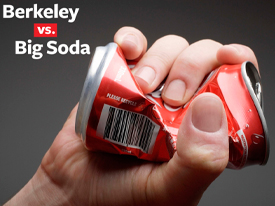Do ‘soda taxes’ curb consumption of sugar-sweetened beverages? According to the LA Times article, “Berkeley sees a big drop in soda consumption after penny-per-ounce ‘soda tax,’ this seems to be the case. The article mentions a recent study published in the American Journal of Public Health (AJPH) concerning the consumption patterns of residents in Berkeley five months after the tax was implemented. According to Falbe et al. (2016), lower-income residents in Berkeley reduced their intake of sugar-sweetened beverages by 21% and increased their water consumption by 63% (Kaplan, 2016). Interestingly enough, the neighboring cities actually experienced an increase in consumption of sugar-sweetened beverages and only a 19% increase in water consumption (Kaplan, 2016). While these are promising results, does this mean that a soda-tax will be just as successful in other places as well?
The LA Times article echoes a lot of what the AJPH article says and makes a lukewarm endorsement of ‘soda taxes’ at the most. Both the LA Times article and the AJPH article both state that it is unknown that such a tax would work in other cities since the study was only done in one city. It would be erroneous to state that what will work in Berkeley, a city with a population of 120,927 will work in a city like Washington D.C., with a population of around 672,228 (U.S. Census Bureau, 2015). Another thing to take in consideration is the presently held health beliefs before the implementation of the tax. The AJPH article mentioned that the significant decrease in sugar-sweetened beverages could have also been due to Berkeley being a health conscious city. In addition, there was wide community support of these initiatives. In addition, Berkeley has relatively higher median income compared to it’s neighbors. How would these policy affect cities with much lower median incomes? It could have detrimental effects, especially in places which are food insecure. The APJH article was quite transparent in realizing the limitations of the study and called for longer-term studies.
While this is a short-term study, health practitioners, especially those who work in health policy and community health, can find some takeaways from these studies. As mentioned previously, it is integral to garner community support on the implementation of a ‘soda tax.’ There could be opposition to this measure by community members for some might see it as an infringement on their freedoms and punishing them for the choices they have. In other words, there would be a mismatch between policy and community concerns. Secondly, health practitioners in these areas could see that in order to gain support for these measures, one must be already be health conscious. Before even proposing this tax, practitioners should set the groundwork in creating community-wide programs which gets people thinking about their health.
SOURCES
Falbe, J., Thompson, H., Becker, C., Rojas, N., McCulloch, C., & Madsen, K. (2016). Impact of the Berkley Excise Tax on Sugar-Sweetened Beverage
Consumption. American Journal of Public Health, 106(10), 1865-1871.
Kaplan, K (23 August 2016). Berkeley sees big drop in soda consumption after penny-per-ounce ‘soda tax.’ LA Times. Retrieved from
http://www.latimes.com/science/sciencenow/la-sci-sn-soda-tax-works-20160823-snap-story.html
U.S. Census Bureau (2015). Quickfacts. Retrieved from http://www.census.gov/quickfacts/table/PST045215/11,0606000,00.
